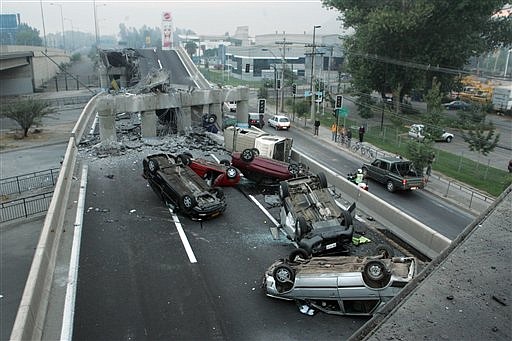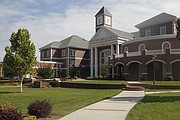The loud, long scream of wailing sirens across Hawaii's islands Saturday created an eerie, almost unnerving scene that Ken Berry said could have been straight out of an old war movie.
Cars clogged the state's roads, resembling parking lots with vehicles "in every nook and cranny," Mr. Berry said in a telephone interview from Honolulu.
The 8.8-magnitude earthquake that shook Chile many hours before sent waves barreling north across the Pacific at the speed of a jetliner, leaving Hawaiians scrambling to local grocery stores, desperate to prepare for what they believed would be one of the biggest tsunamis to hit the state since the 1960s.
"There wasn't any laughter," said Mr. Berry, who is the targeted publications director for the Chattanooga Times Free Press. "The people were somber. These were people who were obviously taking the warning very seriously, because they were stocking up on water and rice and other cooking materials."
Several hours after the waves were expected to hit and had not yet caused any serious damage, people began to express frustration that major highways remained closed, he said.
There were no immediate reports of widespread damage around the Pacific Rim, just tidal surges that reached up to about 7 feet in some island chains. Waves hit California, but barely registered amid stormy weather. No injuries or major property damage were reported, The Associated Press reported.
Japan later braced for a direct hit and waves up to 10 feet high.
In Hawaii, Mr. Berry said the palpable panic he and others in Hawaii felt in the early morning hours soon dissipated as they watched the waves from afar.
By about 12:40 p.m. (5:40 p.m. EST) there were still no signs of massive waves, Mr. Berry said, and the mood began to shift.
The 66-year-old who now calls Chattanooga home lived in Hawaii for more than 35 years and has been through several tsunami warnings, but Saturday's "seemed to create a little more panic," he said.
"With this one, the news seemed to conjure up in the minds of local people stories they'd heard about some real serious tsunamis in the mid-1900s that cost a lot of lives," Mr. Berry said.
Hawaiians on the west coast of Oahu got the all-clear from danger by the Pacific Tsunami Warning Center just before 2 p.m. (7 p.m. EST), according to Chattanooga resident Glen Kahana who received a call from his brother in Hawaii just after the announcement was made.
Mr. Kahana, a Hawaii native and husband of Times Free Press advertising director Leslie Kahana, said he spent most of Saturday corresponding with his five brothers and sisters in Hawaii.
"My first concern was ... that a tsunami was possibly imminent to hit the Pacific region," he said. "So I was pretty concerned, not knowing what the magnitude of the tsunami would be in Hawaii."
As the day wore on and there were still no signs of immense waves, Mr. Kahana said his worry subsided and he felt that "maybe we dodged a big one."
But uncertainty still lingers for those with families in Chile.
Ghislaine Acevedo, a 20-year-old native Chilean living in Chattanooga, said she heard from some family members in her home country, but not all. She heard the news of the quake early Saturday morning when a family member called and confirmed her immediate family in Chile was OK, their homes untouched despite the earthquake being close to the epicenter just outside Concepcion.
Thoughts of the recent devastation caused by the 7.0-magnitude earthquake in Haiti quickly came to mind, Ms. Acevedo said.
"I was thinking, 'Oh no, it's going to be another Haiti," she said. "I was very affected (by the Haiti earthquake), too, because I have friends from Haiti and I saw what happened with them when they lost family, and the thought that that could happen to me."
Ms. Acevedo said she couldn't help but think about the fact that she was supposed to be in Chile when the quake hit. She had intended to spend several weeks there with family but was unable to make the trip because of school and work commitments, she said.
"My heart's with my country," Ms. Acevedo said. "I'm very concerned, because I just want to know about my family. I feel so helpless."
Ms. Acevedo said she and her family members would continue attempting to contact loved ones in Chile. She worries about her cousins, who live close to the coastline, and her 80-year-old grandmother in Santiago.
Barbara Alexander, executive director of the Greater Chattanooga Area Red Cross, said the American Red Cross is still figuring out details of the relief efforts to the area.

